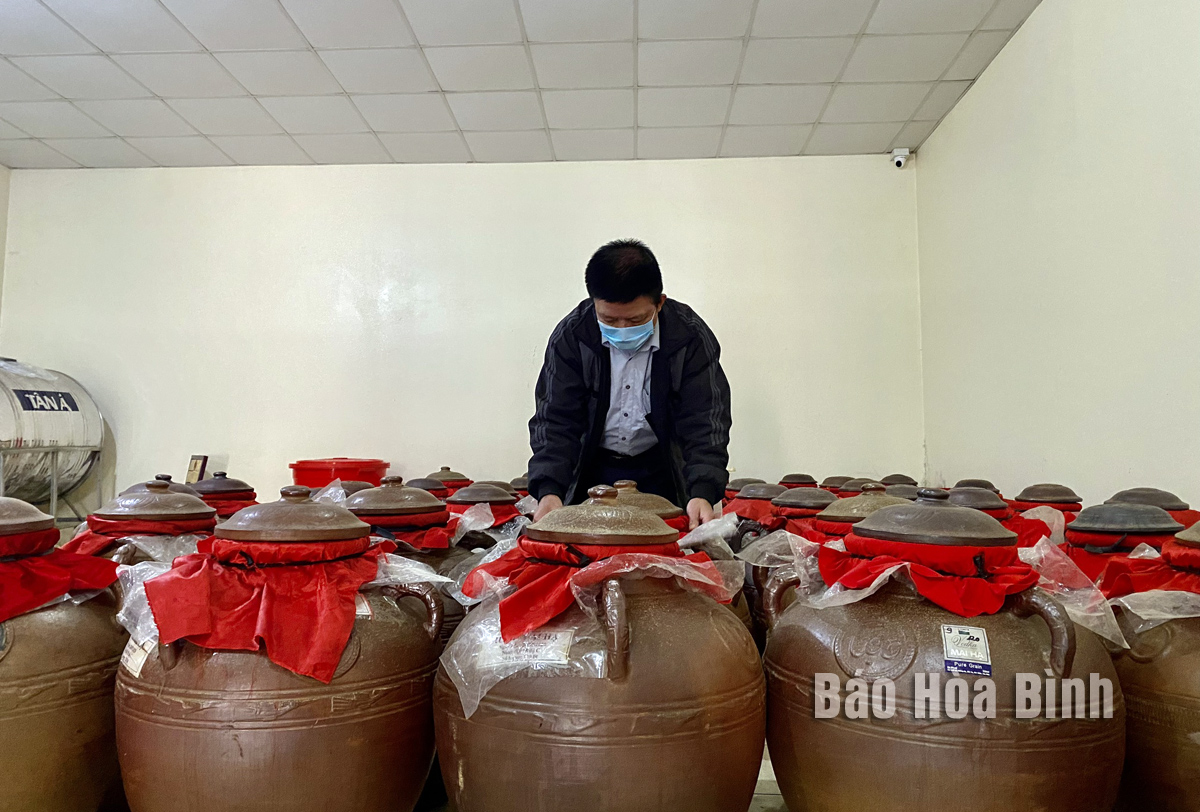
Hoa Binh province is home to 11 recognised traditional craft villages which have played a crucial role in increasing income, improving living conditions, and driving economic growth in rural areas.
Residents of Mai Ha alcohol village (Mai Ha commune, Mai Chau district) examine product quality before distribution.
Among these, Mai Ha alcohol village in Mai Ha commune, Mai Chau district, stands out as a model of cultural preservation combined with economic growth. Mai Ha alcohol is not only a distinctive local beverage but also a source of pride for the community.
Mai Ha alcohol stands out for its traditional distillation, using natural underground water and a unique herbal fermentation starter made from over a dozen forest plants. This process, refined over generations, produces a crystal-clear liquor with a smooth taste and lingering sweetness.
More than 200 households in the village produce thousands of litres of alcohol annually, gaining nationwide recognition. The brand has earned a three-star rating under the national One Commune One Product (OCOP) programme, boosting its market value and distribution.
Beyond providing stable income, alcohol production preserves a cultural heritage passed down through generations. The village has become a tourist attraction, drawing visitors eager to witness the process and sample the famed liquor.
According to the provincial Sub-Department of Rural Development, Hoa Binh has 11 recognised craft villages. Two of them, including Mai Ha, specialise in alcohol production, while others focus on woodwork, bamboo weaving, ceramics, and brocade textiles. These industries sustain traditional values while generating income for rural communities.
The province’s craft villages employ around 1,300 workers, with monthly wages ranging from 3 to 5 million VND. Many have developed OCOP-certified products, enhancing market appeal.
Despite their contributions, challenges persist such as unstable raw material supplies, market competition, a lack of skilled successors, and outdated production techniques. Despite the government's support policies, access to loans and trade promotion remain limited.
Hoang Van Tuan, Deputy Director of the Sub-Department of Rural Development, reaffirmed the province’s commitment to training programmes, business networking, and product promotion. Authorities are also strengthening quality control and embracing digital transformation, registering products for traceability and showcasing them on e-commerce platforms to expand markets.
These combined efforts are driving Hoa Binh’s craft villages forward, contributing to the rural areas' development.
Ha Thi Ha Chi, a 26-year-old graduate in law, has taken an unconventional path by returning to her hometown in Mai Chau district to establish the Tong Dau Cooperative, creating stable jobs for local women and bringing Thai ethnic brocade weaving to the global market.
As the Lunar New Year 2025 approached, pork prices surged, creating a profitable season for farmers in Tan Vinh commune, Luong Son district. Taking advantage of the rising demand, Can Minh Son, a farmer from Coi hamlet, sold over 30 pigs at 69,000 VND/kg, each weighing more than 100 kg. After deducting expenses, his family earned a profit of over 50 million VND.
alternate member of the Central Party Committee, Secretary of the Hoa Binh provincial Party Committee Nguyen Phi Long on March 5 had a working session with Yan Jiehe, Founder and Chairman of the China Pacific Construction Group, one of China's largest private corporations in the field of transport infrastructure. Deputy Secretary of the provincial Party Committee, Chairman of the provincial People's Committee Bui Duc Hinh and leaders of provincial departments and sectors also attended the working session.
The electronic printed circuit board (PCB) manufacturing and processing plant of Japan’s Meiko Group, located at Da River Left Bank Industrial Park in Hoa Binh city with a total investment of over 200 million USD, is expected to create thousands of jobs and make a significant contribution to the local budget.
Deputy Secretary of the Hoa Binh provincial Party Committee and Chairman of the provincial People’s Committee Bui Duc Hinh had a working session with the Vietnam Electricity (EVN)’s Northern Power Corporation (EVNNPC) and Hoa Binh Power Company on March 3.
Concessional loans from the Vietnam Bank for Social Policies (VBSP) have made significant contributions to delivering Hoa Binh province’s sustainable poverty alleviation target over the past years. Thanks to the loans, thousands of jobs are generated for local workers every year, helping them improve income.



